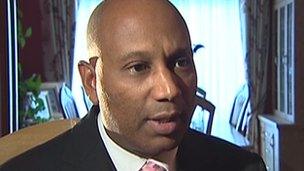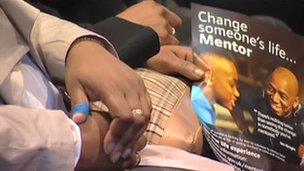Mayor Boris Johnson's violent youth scheme criticised
- Published

Mr Belgrave was made redundant in January
A former senior official has condemned the London mayor's administration over its attempts to prevent young black men becoming involved in violence.
Ron Belgrave said the approach was "superficial, unserious and seeking to do as little as possible".
Mr Belgrave, who was responsible for community safety, has lodged a formal complaint with the district auditor.
The mayor's advisor for policing, Kit Malthouse, denied the claims, saying Mr Belgrave was a disgruntled ex employee.
Four years ago, Boris Johnson launched his <link> <caption> Time for Action plan</caption> <altText> Time for Action plan</altText> <url href="http://www.london.gov.uk/who-runs-london/mayor/publications/safety-and-policing/time-action" platform="highweb"/> </link> which promised to tackle serious youth violence which he recognised - in his election campaign of that year - disproportionately affected black teenagers.
The plan proposed five far-reaching programmes to help prevent young people being drawn into a lifestyle which led to serious violence.
But Mr Belgrave - who said he could not speak out while he was employed by City Hall - says he struggled to get commitment from the beginning, in particular for the work needed to understand why the problem was so acute among young black men.
"In hindsight it appeared that once the Time for Action document was published on 3 November (2008), the commitment to doing anything serious about the problem ended on 4 November," he said.
"It was like the box was ticked, put that in the drawer and let's move on to something else we prefer to spend our time on."
He has now also referred it to the Greater London Assembly's monitoring officer.
'No wiser'
By mid-term in 2010, Mr Belgrave said Mr Johnson was so concerned the commitment to the plan was being openly questioned in black communities, that he established a Mayor's Expert Advisory Group to revitalise it by focusing on engagement with those black communities and a flagship mentoring project.
Ironically that group foundered too because of a perceived lack of commitment.
One of the key contributors to that group, Prof Gus John, resigned accusing the mayor and his administration of a lack of real commitment to understanding and finding viable remedies for the problem of serious youth violence.

The mentoring scheme has approximately 100 pairings
The ambitious aim of the mentoring programme was to match 1,000 black men to 1,000 black boys.
Since the programme began in August 2011, it has consistently missed its targets.
When I investigated the progress of the mentoring project against a backdrop of heavy criticism in October last year, City Hall told me that initial set-up problems had led to delays, but by the election it would be back on track with 350 mentor and mentee pairings.
There are now approximately 100 pairings.
Mr Belgrave said a failure to invest in identifying and preventing the source of the problem of escalating youth violence had made London less safe for young black men.
"The GLA (Greater London Authority) in 2012 is no wiser as to the underlying causes of the chronic youth violence in London than it was in 2008.
"So, in effect, we've had four years of human misery, of young people being killed, blood on the streets, injuries, psychological harm and fear in communities that could have been avoided."
'His failure'
Mr Malthouse, the mayor's adviser on policing, said Mr Belgrave was only speaking out "because he didn't get a job (a reference to him applying for another job while he was facing redundancy).
"Ron Belgrave was supposed to be in charge of it for three years so if there has been a failure it's his failure."
Mr Malthouse added: "The truth is we made a massive commitment to youth violence both on the enforcement and prevention side; working with some very difficult young Londoners and we have made some progress."
He said the project was "newish" and that it was dealing with "deeply ingrained problems and learning as we go is part of the process.
"What we refuse to do is to sit back and put our hands up like cowards and say 'do you know what, it's just too difficult because BBC London might criticise us from time to time'," he added.
- Published20 July 2011
- Published20 December 2011